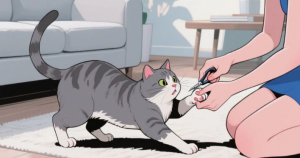Has your cat ever gone through a period of acting indifferent toward you? You try to pet it, and it wriggles away; you call its name, and it just stays put, as steady as a rock. Don’t panic—this might mean you’ve accidentally stepped on one of its “territorial landmines.” Today, let’s dive into the six boundaries you should never cross with your cat, no matter how close your bond is—otherwise, you could get “blocked” by your feline friend in no time.
-
Forcing Social Interaction
Cat owners, do you ever feel like you just want to tell the whole world, “Look, I have an adorable cat!”? When guests come over or when you take your cat out, you may want it to greet everyone. But for cats, unfamiliar environments, loud noises, and a crowd of strangers can cause their adrenaline to spike, putting their bodies into a stress state.Tip: Respect your cat’s social pace. If your cat voluntarily rubs against a guest, you can praise it. But if it chooses to hide, don’t force it out. Social interaction is not a necessity for cats.
-
Forcing Hugs
After years of having cats, hugging them seems like half the fun, right? But forcing a hug compresses their body, hinders their whiskers’ ability to sense space, and can trigger panic. Your cat might stiffen or try desperately to escape.Tip: Observe your cat before picking it up. If the tail fluffs up or the ears flatten, stop immediately. Instead, squat down and open your palms, letting the cat decide how it wants to approach.
-
Shaving Fur Carelessly
During hot summers, it’s tempting to grab the clippers and shave all the cat hair for a cleaner house. But while your world becomes tidy, your cat’s world becomes “dark.” Without fur protection, cats are more prone to dermatitis and parasites, and their self-esteem takes a hit. Grooming and licking fur also help them regulate emotions and relieve stress.Tip: If you’re worried about heat, turn on the air conditioner or provide a cooling mat instead of shaving.

-
Scare-Tactic Discipline
If your cat accidentally breaks a vase or jumps on the table, never yell or hit it. This can make cats timid, fearful of their owner, and reluctant to interact. Cats think simply—they don’t understand right or wrong; they only know what makes them feel safe and what causes fear.Tip: Gently guide your cat, showing the correct behavior. Provide toys, and feed them on a regular schedule to reinforce positive habits.
-
Bathing Too Frequently
Seeing your cat rolling on the floor or smelling a bit “stinky” may tempt you to give it a bath. But frequent baths strip the natural oils from a cat’s skin, causing dryness and itching. They may scratch themselves or lick until their skin is red and inflamed. Cats also fear water and hairdryers, making the experience stressful and painful.Tip: Cats do not need frequent baths. Every 2–3 months is usually enough. If your cat gets dirty, gently wipe it with a damp towel instead.
-
Ignoring Nail Trimming
Do you think getting a scratching post is enough? Regular nail trimming is a must for every cat owner. Overgrown nails can curl and grow into the paw pads, snag on yarn during play, or cause slipping when your cat jumps.Tip: Trim your cat’s nails every two weeks using cat-specific nail clippers. Avoid cutting into the pink “quick,” and reward your cat with a small treat afterward.





